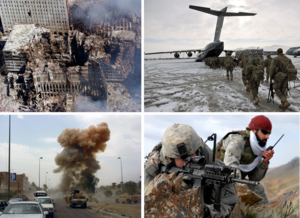Clockwise from top left: Aftermath of the 11 September attacks; US infantry in Afghanistan; a US soldier and Afghan interpreter in Zabul Province, Afghanistan; explosion of an Iraqi car bomb in Baghdad
CATO @ LIBERTY
The U.S.-Afghan strategic partnership framework agreed to on Sunday extends America’s presence in Afghanistan beyond 2014 in a desperate attempt to stave off disaster. The pact allows policymakers to perpetuate our military involvement despite assurances that we are withdrawing. Social and economic development programs will also continue with limited gains. The United States intends to nation-build on the cheap, ensuring Afghanistan remains relianton the Untied States for basic funding and security long into the future.
The pact itself—which was not released—appears to eschew the difficult issues surrounding the exact number of U.S. troops, U.S. bases, and U.S. military aid to Afghan security forces. The estimated cost of training between 230,000-350,000 Afghan soldiers and police could be between $4-6 billion a year, not including the cost of keeping upwards of 20,000 U.S. trainers in the field, which could cost upwards of $15-20 billion (approx. $1 million per soldier). The Afghan government only collects about $2 billion a year in revenue. This does not put Afghanistan on a path to sustainable self-sufficiency, but makes it increasingly dependent on foreign patronage, as it has been for much of its turbulent history. Moreover, while Afghan forces are supposed to take over responsibility of the country, in some insular areas they are despised at least as much as the Taliban.
As the coalition draws down, we can expect more attacks on international compounds and overextended coalition supply lines. Militants get a vote. And for the foreseeable future, Afghanistan will remain a geopolitical battleground, with power split between an internationally backed Western regime and a Pakistan- and Gulf-backed hydra-headed insurgency.
Although Lashkar-e-Taiba and other al Qaeda-linked groups operate in the region, when it comes to capturing and killing terrorists—not indigenous militants—targeted counter-terrorism measures are more effective than expansive counterinsurgency campaigns. With this pact, policymakers are pushing for an open-ended nation-building mission by another name.
Bee's Note: Is this what Obama meant when he said "The War on Terror" is over"??!

